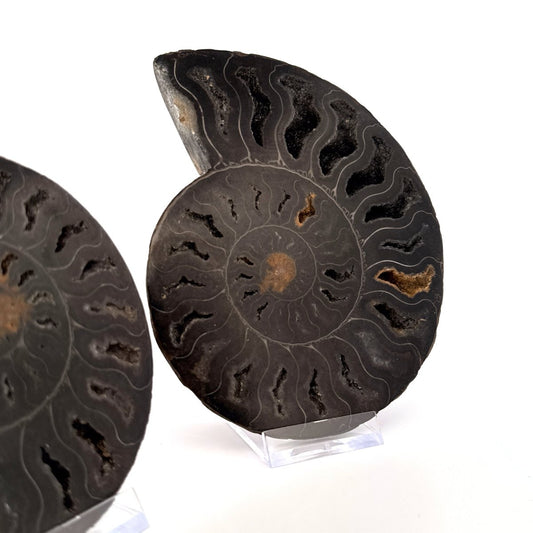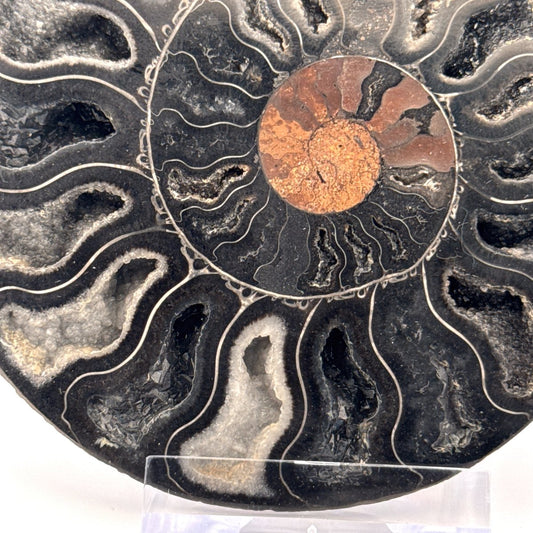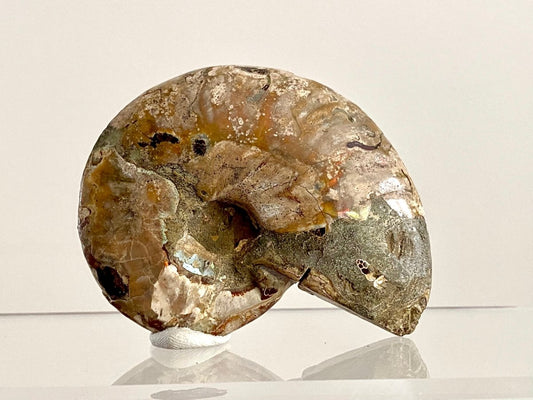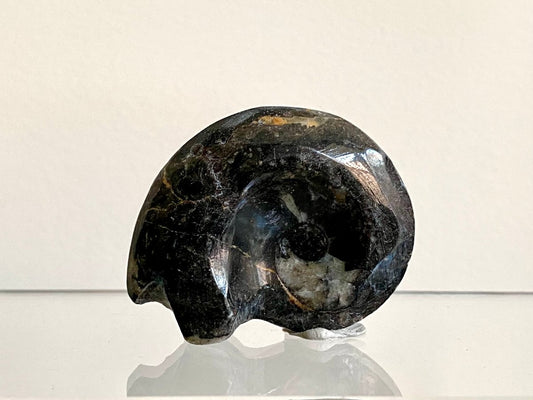Ammonites – Ancient Marvels of the Sea
With spiral shells that resemble those of contemporary nautiluses, ammonites are among the most identifiable and often collected fossils. These extinct marine mollusks are intriguing markers of Earth's old waters and ecosystems since they lived from the Devonian period (approximately 400 million years ago) to the end of the Cretaceous period (about 66 million years ago).
What Are Ammonites?
Ammonites were members of the cephalopods, a group of marine invertebrates that also included cuttlefish, octopuses, and squid. Because of their spiral, horn-shaped shells, they were called after the Egyptian god Ammon, who was frequently shown with ram's horns. Because of their intricate suture systems and chambered shells, ammonites were able to float vertically through the water.
Evolution and Diversity
Over millions of years, ammonites underwent a great deal of change, becoming hundreds of species and adapting to various marine conditions. Because each fossil is unique, paleontologists can distinguish between different ammonites based on the sizes, forms, and complex suture patterns of their shells. While some ammonites, such as the enormous Parapuzosia seppenradensis, reached a diameter of nearly 2 meters (6.5 feet), others were microscopic, measuring less than an inch across.
How Did Ammonites Live?
We know that ammonites were predators, utilizing their tentacles to capture prey including plankton, tiny fish, and crustaceans, though many specifics are still unknown. They were proficient hunters thanks to their well-developed eyes and tentacles, and their coiled shells helped them regulate their buoyancy. It is believed that ammonites, like contemporary cephalopods, used jet propulsion to move across the seas.
Ammonites as Index Fossils
Ammonites serve as index fossils, one of its most important scientific functions. They are very helpful for dating and determining the age of rock layers all over the world because of their quick evolution and extensive spread. Because different ammonite species only existed for brief periods of time, paleontologists may use them to date the sedimentary strata they are found in with remarkable accuracy.
Extinction of Ammonites
Ammonites flourished for hundreds of millions of years, but the mass extinction that wiped out the dinosaurs at the end of the Cretaceous period, some 66 million years ago, put an end to their dominance. Because ammonites mostly depended on the delicate balance of oceanic ecosystems, theories imply that the asteroid impact, which caused significant climatic shifts and ocean acidification, may have made it difficult for them to survive.
Ammonite fossils for sale
-
Small Iridescent Ammonite fossil (1.48") - Cretaceous, Madagascar
Regular price €9,50 EURRegular priceUnit price / per -
Small Iridescent Ammonite fossil (1.63") - Cretaceous, Madagascar
Regular price €9,50 EURRegular priceUnit price / per -
Small Iridescent Ammonite fossil (1.59") - Cretaceous, Madagascar
Regular price €9,50 EURRegular priceUnit price / per -
Small Iridescent Ammonite fossil (1.72") - Cretaceous, Madagascar
Regular price €9,50 EURRegular priceUnit price / per -
Small Iridescent Ammonite fossil (1.80") - Cretaceous, Madagascar
Regular price €9,50 EURRegular priceUnit price / per -
Small Agatized Ammonite Fossil (1.34") - Cretaceous, Madagascar
Regular price €10,95 EURRegular priceUnit price / per -
Small Agatized Ammonite Fossil (1.17") - Cretaceous, Madagascar
Regular price €10,95 EURRegular priceUnit price / per -
Small Agatized Ammonite Fossil (1.27") - Cretaceous, Madagascar
Regular price €10,95 EURRegular priceUnit price / per -
Small Agatized Ammonite Fossil (1.28") - Cretaceous, Madagascar
Regular price €10,95 EURRegular priceUnit price / per -
Small Agatized Ammonite Fossil (1.20") - Cretaceous, Madagascar
Regular price €10,95 EURRegular priceUnit price / per -
Cut and Polished Cleoniceras Ammonite Fossil (5.53") – Cretaceous, Madagascar
Regular price €92,50 EURRegular priceUnit price / per -
Cut and Polished Cleoniceras Ammonite Fossil (4.47") – Cretaceous, Madagascar
Regular price €42,50 EURRegular priceUnit price / per -
Ammonite Pendant on necklace – Fossil Jewelry from Madagascar
Regular price €17,50 EURRegular priceUnit price / per -
Ammonite Pendant on necklace – Fossil Jewelry from Madagascar
Regular price €17,50 EURRegular priceUnit price / per -
Ammonite Pendant on necklace – Fossil Jewelry from Madagascar
Regular price €17,50 EURRegular priceUnit price / per -
Cleoniceras Ammonite Fossil (3.20") – Cretaceous Period, Madagascar
Regular price €11,00 EURRegular priceUnit price / per -
Cleoniceras Ammonite Fossil (2.99") – Cretaceous Period, Madagascar
Regular price €12,50 EURRegular priceUnit price / per -
2.18” Devonian Goniatite fossil from Morocco
Regular price €8,95 EURRegular priceUnit price / per -
1.88” Devonian Goniatite fossil from Morocco
Regular price €8,95 EURRegular priceUnit price / per -
2.16” Devonian Goniatite fossil from Morocco
Regular price €8,95 EURRegular priceUnit price / per -
2.05” Devonian Goniatite fossil from Morocco
Regular price €8,95 EURRegular priceUnit price / per -
5.65" Ammonite Fossil, Cleoniceras species (2-sides, cut and polished)
Regular price €81,50 EURRegular priceUnit price / per -
5.06" Ammonite Fossil, Cleoniceras species (2-sides, cut and polished)
Regular price €62,50 EURRegular priceUnit price / per -
5.80" Ammonite Fossil, Cleoniceras species (2-sides, cut and polished)
Regular price €87,00 EURRegular priceUnit price / per -
6.49" Ammonite Fossil, Cleoniceras species (2-sides, cut and polished)
Regular price €125,00 EURRegular priceUnit price / per


















































